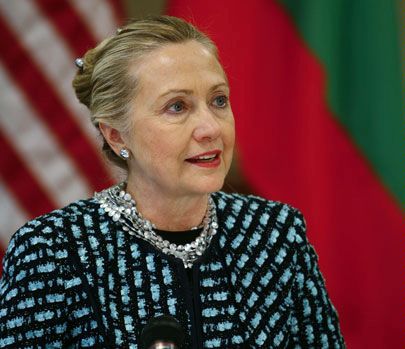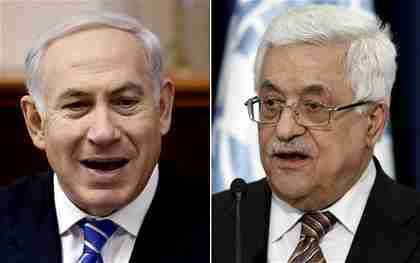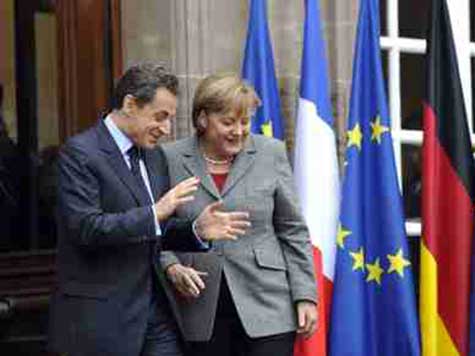
This morning’s key headlines from GenerationalDynamics.com.
- Angela Merkel campaigns for Nicolas Sarkozy
- Greece’s parties agree to substantial spending cuts
- U.S. closes embassy in Damascus, Syria
- Russia, stung by criticism, meets with Assad in Syria
- Civil war in Syria?
- Palestinian Authority / Fatah sign unity agreement with Hamas
- Israel PM Benjamin Netanyahu condemns Palestinian unity plan
On some days there’s no news, and on other days there’s too much news. This is one of the latter days.
Angela Merkel campaigns for Nicolas Sarkozy
Nicolas Sarkozy has not yet even officially announced his intention to run for another term as president of France, but it’s already clear that German Chancellor Angela Merkel is going to campaign for him. According to Der Spiegel, “The sober chancellor and the peripatetic president have established a pact, the likes of which has never before been seen in the Franco-German relationship. Merkel has decided to openly campaign for her partner in Paris. For Sarkozy, she is discarding the reserve that chancellors have for decades felt proper when it comes to democratic elections outside German borders. When Sarkozy begins stumping, she will be standing next to him on stage — at least that is the plan.” In fact, this is a plan of desperation, since polls indicate that Sarkozy is far behind his Socialist party challenger, Francois Hollande. Hollande is opposed to many of Merkel’s austerity programs, which have been supported by Sarkozy. If Sarkozy is not re-elected, then Merkel’s entire European strategy could fail as well. Der Spiegel
Greece’s parties agree to substantial spending cuts
Several European leaders, including Nicolas Sarkozy, Angela Merkel, and Jean-Claude Juncker, all sent a strong message to Greece on Monday that after weeks of delay upon delay, they now had only hours to come to an agreement, or face disorderly bankruptcy in March. The message seemed to have an effect, as Greece’s three coalition parties claim to have agreed on several billion euros’ worth of savings, with final details to be worked out on Tuesday. The announced terms include the following:
- The civil service will cut 15,000 jobs by the end of this year — the first step toward the elimination of 150,000 public sector jobs the government has pledged to EU officials.
- There will be €1.1 billion savings from cuts in spending on health and medicines.
- A bitterly disputed issue is a 20-22% cut in the minimum wage, to €751.00 per month (gross) that about 300,000 Greeks receive. However, cuts to the minimum wage will have a knock-on effect because they will lead to a €1.3-billion drop in tax revenues and a €2.4-billion reduction in social security contributions. This means the government will have to make up for these losses.
- Collective bargaining rights will be reduced, allowing employers to negotiate individual deals with their employees.
EU officials are demanding cuts of €3.3 billion, but these measures only save around €2.5 billion. The remaining €850 million will have to be agreed on Tuesday. Kathimerini
U.S. closes embassy in Damascus, Syria

Secretary of State Hillary Clinton on Sunday
From the State Department on Monday:
“The United States has suspended operations of our Embassy in Damascus as of February 6. Ambassador Ford and all American personnel have now departed the country.
The recent surge in violence, including bombings in Damascus on December 23 and January 6, has raised serious concerns that our Embassy is not sufficiently protected from armed attack. We, along with several other diplomatic missions, conveyed our security concerns to the Syrian Government but the regime failed to respond adequately.
Ambassador Ford has left Damascus but he remains the United States Ambassador to Syria and its people. …
As the Secretary told the Security Council on January 31, we continue to be gravely concerned by the escalation of violence in Syria caused by the regime’s blatant defiance of its commitments to the action plan it agreed to with the Arab League. The deteriorating security situation that led to the suspension of our diplomatic operations makes clear once more the dangerous path Assad has chosen and the regime’s inability to fully control Syria. It also underscores the urgent need for the international community to act without delay to support the Arab League’s transition plan before the regime’s escalating violence puts a political solution out of reach and further jeopardizes regional peace and security.”
At a press conference on Sunday, Secretary of State Hillary Clinton said, “Faced with a neutered Security Council, we have to redouble our efforts outside of the United Nations with those allies and partners who support the Syrian people’s right to have a better future.” Dept. of State and CS Monitor
Russia, stung by criticism, meets with Assad in Syria
With criticism from the West and the Arab League countries growing, Russia’s foreign minister Sergei Lavrov is rushing to Damascus, Syria, to try to convince Syria’s president Bashar al-Assad to end the violence. Russia and China have been drawing increased international criticism of their Saturday veto in the U.N. Security Council of the Arab League’s proposed resolution on Syria. This is especially the case because their veto seems to have given al-Assad the green light to substantially escalate the violence. According to Arab League Secretary-General Nabil Elaraby:
“There was no need for the veto, We were about to reach a conclusion on the resolution that would have been supported by everyone. The (Syrian) government, definitely, may have interpreted this as the international community unable to do anything and (so) we can do whatever we want.”
However, Russian analysts say that Russians were “played for fools” during the Libyan crisis, and are calling the veto a “diplomatic victory,” because Russia is reinforcing its diplomatic clout, defending its interests in the region and threatening to put the West in an embarrassing position if it decides to invade without sanction of the Security Council. Reuters and Ria Novosti
Civil war in Syria?
A lot of the political and punditry talk these days is that Syria is either in a civil war, or close to being in one. The implication is a repeat of the 1976-82 Syrian civil war that climaxed in the massive genocidal slaughter in 1982 in Hama. But from the point of view of Generational Dynamics, a new civil war is impossible at this time, since Syria is in a generational awakening era, with many remaining survivors of the last civil war still alive. If a new civil war breaks out, then it will fizzle relatively quickly, probably within a few months. The real danger for Syria is not that there’ll be a Syrian civil war, but that the violence in Syria will trigger a wider regional war. Neighboring countries, including Turkey, Saudi Arabia, Qatar, Israel, the Palestinian territories, and Egypt are all in a generational crisis era. Sooner or later, something is going to trigger a regional war among these countries, and the Syrian violence might turn out to be that trigger.
Palestinian Authority / Fatah sign unity agreement with Hamas

Benjamin Netanyahu and Mahmoud Abbas (EPA)
With the emir of Qatar, Sheikh Hamad Bin Khalifa al-Thani, acting as mediator, Palestinian Authority (Fatah) president Mahmoud Abbas and Hamas leader Khaled Meshaal signed an agreement on Monday to form a unity government. Hamas and Fatah have been split since the 2007 war that gave Hamas control of Gaza. Egypt has attempted several times to mediate a reconciliation between the two Palestinian groups, but those attempts have always failed. Thus, it will be a major diplomatic coup for Qatar if its mediation efforts succeed. A major dispute that caused previous attempts to fail is that Abbas wanted current Palestinian Prime Minister Salam Fayyad to remain as Prime Minister in the unity government, since he’s a U.S.-educated internationally respected former World Bank economist who can reassure the West about a unity government containing Hamas. However, Hamas is bitterly opposed to Fayyad in the government, so in the new agreement, Abbas will be both president and prime minister of the unity government, something that violates the Palestinian Authority’s own charter. Speaking during the signing ceremony in Doha, Hamas leader Meshaal said:
“We inform our people that we are serious about healing the wounds … to reunite our people on the foundation of a political partnership, in order to devote our effort to resisting the [Israeli] occupation.”
Israel PM Benjamin Netanyahu condemns Palestinian unity plan
Israel’s prime minister Benjamin Netanyahu has condemned the Palestinian unity government deal as a decisive step away from the U.S.-led peace process. A special statement issued by his office said:
“If President Abbas moves to implement what was signed today in Doha, he will abandon the path of peace and join forces with the enemies of peace.
Hamas is an enemy of peace. It’s an Iranian backed terror organization committed to Israel’s destruction. It has not accepted the minimal conditions set by the international community:
* It refuses to recognize Israel’s right to exist.
* It refuses to honor the signed agreements between Israel and the Palestinian Authority.
* It refuses to abandon terrorism. Indeed, it continues to arm itself for even deadlier terrorism.
President Abbas, you can’t have it both ways. It’s either a pact with Hamas or peace with Israel. It’s one or the other. You can’t have them both.”
Israel, the U.S. and Europe have named Hamas as a terrorist group. The removal of Salam Fayyad from the unity government is a serious red flag to the West. Israel PM’s office and Telegraph

COMMENTS
Please let us know if you're having issues with commenting.